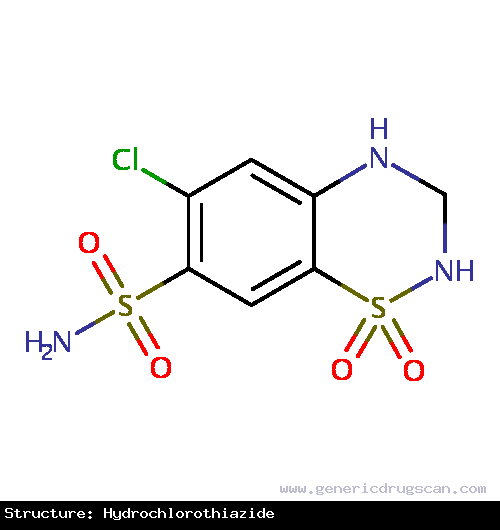Hydrochlorothiazide Drug: Indication, Dosage, Precaution, Side Effect , Storage, Category Type and corresponding Brands - www.genericdrugscan.com
Hydrochlorothiazide
Drug Status in USA : ApprovedDrug Status in Canada : Approved
pronunciation
pronounced as (hye'' droe klor'' oh thye' a zide)
Why is this medication prescribed?
Hydrochlorothiazide is used alone or in combination with other medications to treat high blood pressure. Hydrochlorothiazide is used to treat edema (fluid retention; excess fluid held in body tissues) caused by various medical problems, including heart, kidney, and liver disease and to treat edema caused by using certain medications including estrogen and corticosteroids. Hydrochlorothiazide is in a class of medications called diuretics ('water pills'). It works by causing the kidneys to get rid of unneeded water and salt from the body into the urine.
High blood pressure is a common condition and when not treated, can cause damage to the brain, heart, blood vessels, kidneys and other parts of the body. Damage to these organs may cause heart disease, a heart attack, heart failure, stroke, kidney failure, loss of vision, and other problems. In addition to taking medication, making lifestyle changes will also help to control your blood pressure. These changes include eating a diet that is low in fat and salt, maintaining a healthy weight, exercising at least 30 minutes most days, not smoking, and using alcohol in moderation.
How should this medicine be used?
Hydrochlorothiazide comes as a tablet, capsule, and solution (liquid) to take by mouth. It usually is taken once or twice a day. When used to treat edema, hydrochlorothiazide may be taken daily or only on certain days of the week. Follow the directions on your prescription label carefully, and ask your doctor or pharmacist to explain any part you do not understand. Take hydrochlorothiazide exactly as directed. Do not take more or less of it or take it more often than prescribed by your doctor.
Hydrochlorothiazide controls high blood pressure but does not cure it. Continue to take hydrochlorothiazide even if you feel well. Do not stop taking hydrochlorothiazide without talking to your doctor.
What are the precautions to be followed?
Before taking hydrochlorothiazide,- tell your doctor and pharmacist if you are allergic to hydrochlorothiazide, sulfonamide antibiotic medications, penicillin, or any other drugs.
- tell your doctor and pharmacist what other prescription and nonprescription medications, vitamins, nutritional supplements, and herbal products you are taking or plan to take. Be sure to mention any of the following: barbiturates such as phenobarbital and secobarbital (Seconal); corticosteroids such as betamethasone (Celestone), budesonide (Entocort), cortisone (Cortone), dexamethasone (Decadron, Dexpak, Dexasone, others), fludrocortisone (Florinef), hydrocortisone (Cortef, Hydrocortone), methylprednisolone (Medrol, Meprolone, others), prednisolone (Prelone, others), prednisone (Deltasone, Meticorten, Sterapred, others), and triamcinolone (Aristocort, Azmacort); corticotropin (ACTH, H.P., Acthar Gel); insulin and oral medications for diabetes; lithium (Eskalith, Lithobid); medications for high blood pressure or pain; nonsteroidal anti-inflammatory drugs (NSAIDs) such as ibuprofen (Advil, Motrin, others) and naproxen (Aleve, Naprosyn, others). Your doctor may need to change the doses of your medications or monitor you carefully for side effects.
- if you are taking cholestyramine or colestipol, take them 1 hour before or 4 hours after taking hydrochlorothiazide.
- tell your doctor if you have kidney disease. Your doctor may tell you not to take hydrochlorothiazide.
- tell your doctor if you have or have ever had diabetes, asthma. gout, systemic lupus erythematosus (SLE, a chronic inflammatory condition), high cholesterol, or liver disease.
- tell your doctor if you are pregnant, plan to become pregnant, or are breastfeeding. If you become pregnant while taking hydrochlorothiazide, call your doctor immediately.
- plan to avoid unnecessary or prolonged exposure to sunlight and to wear protective clothing, sunglasses, and sunscreen. Hydrochlorothiazide may make your skin sensitive to sunlight.
- you should know that hydrochlorothiazide may cause dizziness, lightheadedness, and fainting when you get up too quickly from a lying position. This is more common when you first start taking hydrochlorothiazide. To avoid this problem, get out of bed slowly, resting your feet on the floor for a few minutes before standing up. Alcohol can add to these side effects.
What are possible side effects of this medication ?
Tell your doctor if any of these symptoms are severe or do not go away:- frequent urination
- diarrhea
- loss of appetite
- headache
- hair loss
- dry mouth; thirst; nausea; vomiting; weakness, tiredness; drowsiness; restlessness; confusion; muscle weakness, pain, or cramps; fast heartbeat and other signs of dehydration and electrolyte imbalance
- blisters or peeling skin
- hives
- rash
- itching
- difficulty breathing or swallowing
- fever, sore throat, chills, and other signs of infection
- unusual bleeding or bruising
- ongoing pain that begins in the stomach area, but may spread to the back
- joint pain or swelling
- changes in vision, eye pain, or swelling or redness in or around the eye
How to store the medication and dispose it of after its use later?
Keep this medicine in the container it came in, tightly closed, and out of reach of children. Store it at room temperature and away from excess heat and moisture (not in the bathroom). Do not allow the liquid to freeze. Throw away any medicine that is outdated or no longer needed. Talk to your pharmacist about the proper disposal of your medicine.
Drug Category/Class
- Antihypertensive Agents
- Sodium Chloride Symporter Inhibitors
- Thiazides, Plain
- Low-Ceiling Diuretics, Thiazides
- Low-Ceiling Diuretics and Potassium-Sparing Agents
- Agents Acting on the Renin-Angiotensin System
- Renin-Inhibitors
- Diuretics
- Cardiovascular System
- Thiazides, plain
- Thiazides and potassium in combination
- Thiazides, combinations with other drugs
- Low-ceiling diuretics
| Prescribed | For the treatment of high blood pressure and management of edema. |
| Weight : | 297.739 |
| Structure | Hydrochlorothiazide |
 | |
| Formula | C7H8ClN3O4S2 |
Hydrochlorothiazide has 18 Brands listed
Search Generic Drugs alphabetically
